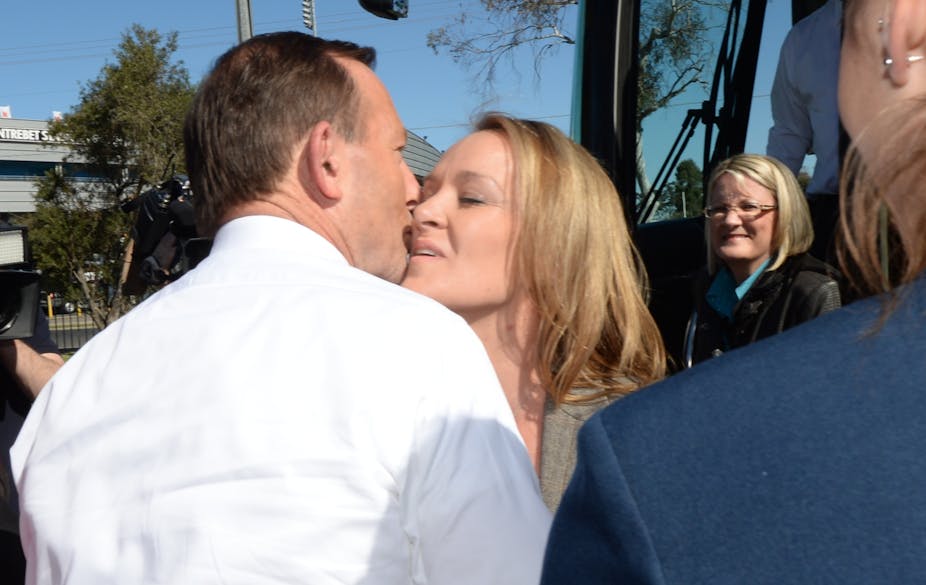Since opposition leader Tony Abbott’s self-described “daggy dad” comments about Liberal candidate Fiona Scott’s sex appeal, gender issues have re-emerged in Australian politics.
Labor frontbenchers claim that these comments reveal what Abbott “really thinks” about women, and cite it as evidence that he is stuck in the past – “a 20th century man”.
But beyond their immediate use for point-scoring in the election campaign, responses to Abbott’s remarks reveal some of the complex and competing elements of how sexism is responded to in Australian social life.
Response #1: Deny any problem
The woman at the centre of the storm, Fiona Scott, has dismissed any concerns about Abbott’s reference to her “sex appeal”, calling it a “charming compliment”. Former sex discrimination commissioner turned NSW state Liberal MP Pru Goward has also downplayed its significance, saying that “a lot of politicians are described as sexy”. So what’s the problem?
To be sure, the “sex appeal” comment is a far cry from some of Abbott’s earlier observations about gender, including his notorious claims that women are physiologically less suited to leadership than men, and that abortion is “the easy way out”.
But this kind of thing does matter. It reinforces views about gender that are detrimental to women in politics and public life. Women in politics get a short term boost to their likeability and “relatability” from being seen to be “a good sport”, but this often comes at a cost to their perceived credibility. It also perpetuates long-standing gender stereotypes that relegate women to primary roles as decorative and attractive helpmates to the real protagonists: naturally assumed to be men.
Response #2: Ignore it and move on
The initial response from Labor was to play a straight bat, with Labor HQ issuing a statement that “Mr Abbott’s comments are entirely a matter for Mr Abbott”.
Although the remark has since been condemned by several senior Labor figures, including prime minister Kevin Rudd, Anthony Albanese, Kim Carr and Penny Wong, ALP frontbencher Kate Ellis reflects the caution of many women about calling out sexism. Ellis reportedly declined to comment on the sexism allegation, tweeting that she had heard “loud and clear” the message that voters “want focus on THEIR issues”.
This apparent wariness about being “derailed” by sexism reflects a reality in which women are often penalised for calling out instances of sexism experienced or witnessed by them. Researchers have found that women who make complaints of sexism are often seen as unlikeable troublemakers, especially by men.
One of the reasons that former prime minister Julia Gillard’s misogyny speech was greeted with such excitement was that it seemed to open more possibilities for women to speak out about sexism in their own lives. Reluctance of public figures to speak out against sexist remarks, as understandable and strategic as it may be, creates a climate that makes it harder for women to protest instances of sexism in their workplaces and private lives.
Response #3: Try a gender reversal
Another minimising response to sexism is to suggest that men experience sexism too, or that they wouldn’t mind if they did. Witness Liberal MP Christopher Pyne’s “wish [that] people would describe [him] as having sex appeal”, or Amanda Vanstone’s claim that women frequently comment on how “nicely men are packed”.
This simplistic gender reversal analysis fails to take into account that comments about appearance and desirability are made in a social context that emphasises the centrality of these attributes to women’s identity. Women are objectified - seen as objects to be judged in terms of beauty and desirability - to a far greater extent than men, and with more far-reaching consequences.
Comments such as Abbott’s legitimise this kind of attention in a sphere where it is entirely unwarranted.
Response #4: Accuse others of (wilful) misunderstanding
Finally, a frequent response to allegations of sexism is to suggest that those who are offended have simply misunderstood, misinterpreted, or over-reacted to the speaker’s true intention. For example, many senior figures in the Liberal party have rushed to defend Abbott, stating that his comments were “largely in jest”, “clearly light-hearted”, and “not offensive”. Former prime minister John Howard has weighed in to suggest that “the reaction of some people who tut-tutted about it is out of proportion and ridiculous”.
It seems fair to assume that Abbott did not intend to demean Scott. She is, after all, a candidate from his own party, and he was attending the event to extol her virtues. The remark has many similarities to US president Barack Obama’s “endorsement” of Kamala Harris as “by far, the best looking attorney-general”.
But intention is not the key issue. These kinds of comments have serious consequences for both the individual woman involved and for women in public life more generally. Pervasive gender stereotypes mean that women are already fighting a battle to be seen as potential leaders, and comments about traditionally feminine attributes, such as sex appeal, reduce the perceived competence and suitability of women for public office.
While president Obama later apologised for his remarks, Tony Abbott brushed off his comment as a harmless over-exuberant “daggy dad moment”.
Another word for “dad” is “patriarch”.

